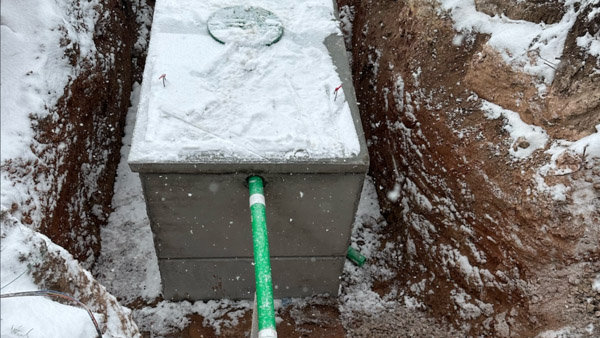Your septic system may be out of sight, but it shouldn’t be out of mind—especially when the weather changes. Rain, snow, extreme temperatures, and even drought can all affect how your system functions. Understanding how different weather conditions impact your septic system can help you prevent costly repairs and keep everything running smoothly.
How Different Weather Conditions Affect Your Septic System
1. Heavy Rain and Flooding
Excessive rainfall can overwhelm your drain field, making it difficult for wastewater to properly filter and disperse. When the soil becomes saturated, your septic system may struggle to absorb the liquid, leading to backups, slow drainage, and even system failure.
Signs of a Problem:
- Water pooling near the drain field
- Slow or gurgling drains inside the house
- Sewage odors in your yard or home
What to Do:
- Reduce water usage during and after heavy rain to prevent overloading the system.
- Make sure your gutters and downspouts direct water away from the drain field.
- Avoid driving or parking over the drain field, as compacted soil reduces drainage efficiency.
2. Freezing Temperatures and Snow
Cold weather can cause pipes, tank components, and drain lines to freeze, especially if your system isn’t buried deep enough. A frozen septic system can lead to backups and serious damage.
Signs of a Problem:
- Toilets and drains backing up despite normal usage
- Gurgling sounds when flushing or draining water
- A frozen drain field, which may prevent wastewater from filtering properly
What to Do:
- Keep your system insulated with a thick layer of mulch, leaves, or straw over the drain field.
- Avoid compacting snow over the system by keeping vehicles and heavy equipment off the area.
- Let a small stream of warm water trickle through your pipes on extremely cold nights to prevent freezing.
3. Drought and Dry Weather
While too much water can overwhelm your septic system, too little water can cause its own set of problems. During prolonged dry periods, the soil in the drain field can harden and crack, making it less effective at filtering wastewater. Additionally, a lack of water can disrupt the balance of bacteria in your septic tank, slowing down waste breakdown.
Signs of a Problem:
- Strong sewage odors from the tank or drain field
- Toilets that flush weakly due to low water flow
- Drain field absorption issues due to dry, compacted soil
What to Do:
- Use water efficiently but consistently to keep the system balanced.
- Avoid excessive tree and plant growth near the drain field to prevent roots from taking up needed moisture.
- Schedule routine maintenance to ensure bacteria levels in the tank remain healthy.
4. Extreme Heat and Humidity
High temperatures and humidity can accelerate bacterial activity in your septic tank. While bacteria are essential for breaking down waste, excessive heat can speed up decomposition, leading to foul odors and potential system imbalances. Additionally, heat can dry out the soil, reducing its ability to absorb water efficiently.
Signs of a Problem:
- Strong septic odors in and around the tank
- Increased gurgling noises from drains
- Faster-than-normal tank filling due to rapid decomposition of solids
What to Do:
- Keep the tank lid securely closed to prevent excessive evaporation.
- Monitor water usage to ensure the system doesn’t get overloaded.
- Have your tank inspected regularly to ensure it’s functioning properly.
General Tips for Weather-Proofing Your Septic System
Regardless of the weather, there are steps you can take to keep your septic system functioning efficiently year-round:
- Schedule Regular Inspections – A professional inspection can catch potential issues before they become major problems.
- Pump Your Tank as Needed – Most septic tanks need pumping every 3-5 years, depending on household size and usage.
- Protect Your Drain Field – Keep heavy vehicles, structures, and excessive landscaping away from this area to prevent compaction.
- Be Mindful of Water Usage – During extreme weather, adjust your water usage to avoid putting unnecessary stress on the system.
- Address Problems Quickly – If you notice slow drains, odors, or pooling water, contact a septic professional before the issue worsens.
Weather can have a significant impact on your septic system, but with the right preventative measures, you can keep it running smoothly in any season. If you suspect weather-related damage to your septic system, don’t wait—reach out to a professional for an inspection and necessary repairs.
Need expert septic services? Contact Regal Service today for reliable maintenance, repairs, and system inspections to keep your septic system in top shape year-round.
